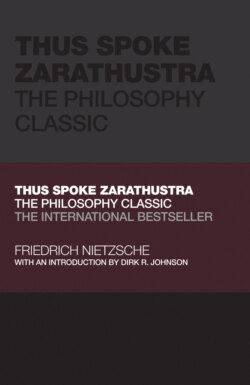Читать книгу Thus Spoke Zarathustra - FRIEDRICH NIETZSCHE, Friedrich Nietzsche - Страница 11
WANDERING YEARS
ОглавлениеNietzsche now embarked on a ten‐year (1879–1888) itinerant lifestyle that took him further away from his native Germany and to a range of European locales: Sils in Switzerland, Nice in France, Genoa and Turin in Italy. All the while he read widely. Aside from the ancients, whose works, as a scholar of antiquity, he already knew well, he added to the list more contemporary literature, such as the French moralists and novelists, English moralists, and Russian authors, as well as classical works of European literature.
Nietzsche also began to examine specialized scientific treatises on physiology and biology, and other texts dealing with the wider natural sciences. Most of all, he was intrigued by literature emerging on the question of morality and human development. Darwin was the hidden reference point for these naturalist investigations.
His reading at the time reflects the two sides of Nietzsche's complex nature. On the one side he was drawn to the cultural tradition of ancient Greece as well as the cultural output of the West. Since his youth, he had dabbled in literary production, writing mocking sketches as well as drafts for plays. He was also well versed in the rich German musical tradition. He was an accomplished pianist, though his own compositions are not highly regarded today. (Later, he suggested that the entire Zarathustra should be considered music.3) And throughout his life he wrote poetry. Having grown up in an intensely fertile cultural period, Nietzsche always harbored an ambition to make his mark on culture.
On the other side, there was a probing, scientifically inclined intellect that could get to the heart of the matter with incredible vigor and precision. This part of his nature was sharpened further by his rigorous philological studies, which trained him to parse ancient texts with a cool, analytical mind. Nietzsche's boundless curiosity also drew him to the advances in a wider range of academic disciplines, including the natural sciences. These gave him both a greater field of content as well as exposing him to new methods and insights into the areas that interested him most – above all, history, philosophy, religion, and the arts.
Despite having grown up in a religious household – his father was a Lutheran pastor – Nietzsche had come a long way from his childhood roots. Deciding early on to pursue an academic career in philology (displeasing his pious mother, who had wanted him to study theology), Nietzsche had taken gradual, though decisive, steps away from his Christian upbringing. He later claimed that his childhood faith had just slipped away, and he had encountered no struggle with it. It is an illuminating remark from a thinker whose masterpiece would initiate a radical break with Christianity.
